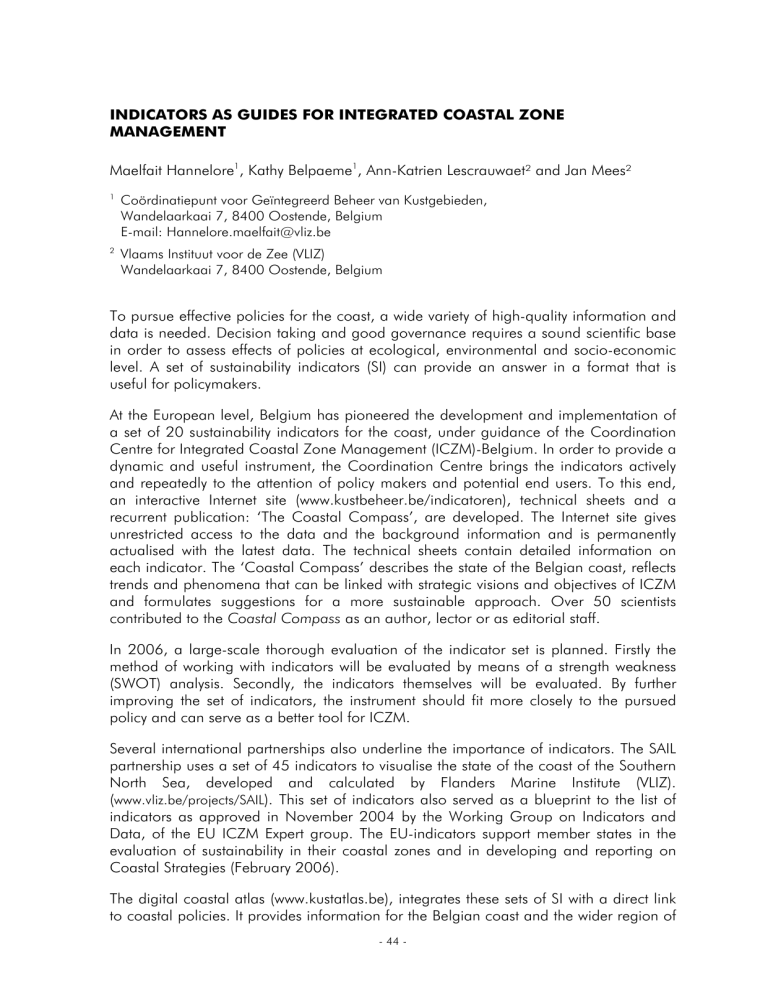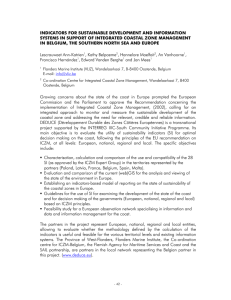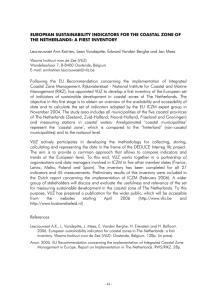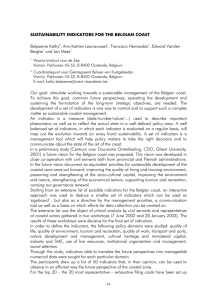Maelfait Hannelore , Kathy Belpaeme , Ann-Katrien Lescrauwaet² and Jan Mees²

INDICATORS AS GUIDES FOR INTEGRATED COASTAL ZONE
MANAGEMENT
Maelfait Hannelore 1 , Kathy Belpaeme 1 , Ann-Katrien Lescrauwaet² and Jan Mees²
1 Coördinatiepunt voor Geïntegreerd Beheer van Kustgebieden,
Wandelaarkaai 7, 8400 Oostende, Belgium
E-mail: Hannelore.maelfait@vliz.be
2 Vlaams Instituut voor de Zee (VLIZ)
Wandelaarkaai 7, 8400 Oostende, Belgium
To pursue effective policies for the coast, a wide variety of high-quality information and data is needed. Decision taking and good governance requires a sound scientific base in order to assess effects of policies at ecological, environmental and socio-economic level. A set of sustainability indicators (SI) can provide an answer in a format that is useful for policymakers.
At the European level, Belgium has pioneered the development and implementation of a set of 20 sustainability indicators for the coast, under guidance of the Coordination
Centre for Integrated Coastal Zone Management (ICZM)-Belgium. In order to provide a dynamic and useful instrument, the Coordination Centre brings the indicators actively and repeatedly to the attention of policy makers and potential end users. To this end, an interactive Internet site (www.kustbeheer.be/indicatoren), technical sheets and a recurrent publication: ‘The Coastal Compass’, are developed. The Internet site gives unrestricted access to the data and the background information and is permanently actualised with the latest data. The technical sheets contain detailed information on each indicator. The ‘Coastal Compass’ describes the state of the Belgian coast, reflects trends and phenomena that can be linked with strategic visions and objectives of ICZM and formulates suggestions for a more sustainable approach. Over 50 scientists contributed to the Coastal Compass as an author, lector or as editorial staff.
In 2006, a large-scale thorough evaluation of the indicator set is planned. Firstly the method of working with indicators will be evaluated by means of a strength weakness
(SWOT) analysis. Secondly, the indicators themselves will be evaluated. By further improving the set of indicators, the instrument should fit more closely to the pursued policy and can serve as a better tool for ICZM.
Several international partnerships also underline the importance of indicators. The SAIL partnership uses a set of 45 indicators to visualise the state of the coast of the Southern
North Sea, developed and calculated by Flanders Marine Institute (VLIZ).
( www.vliz.be/projects/SAIL ). This set of indicators also served as a blueprint to the list of indicators as approved in November 2004 by the Working Group on Indicators and
Data, of the EU ICZM Expert group. The EU-indicators support member states in the evaluation of sustainability in their coastal zones and in developing and reporting on
Coastal Strategies (February 2006).
The digital coastal atlas (www.kustatlas.be), integrates these sets of SI with a direct link to coastal policies. It provides information for the Belgian coast and the wider region of
- 44 -
the southern North Sea, on themes such as nature, culture, the physical environment, tourism, industry, fishery, others…The website is available in English, French, German and Dutch.
References
Anon. 2003. Proposal for a sustainability barometer for the coastal zone. Environmental
Consultancy and Assistance (ECOLAS). Antwerpen, Belgium. xi, 45p.+ annexes.
Belpaeme K. and H. Maelfait. 2005. The coastal compass, indicators as guides for integrated coastal zone management. Coordination Centre for Integrated Coastal Zone Management:
Oostende, Belgium. 80p.
Belpaeme K. and P. Konings (Eds). 2004. The coastal atlas Flanders-Belgium. 99p.
Lescrauwaet A.K. et al.
2005. State of the Coast of the Southern North Sea. Vlaams Instituut voor de Zee (VLIZ). Oostende, Belgium.
Paredis E.; T. Block, and J. Van Assche. 2001. Moving towards sustainability indicators for the coastal area. Universiteit Gent. Centrum voor Duurzame Ontwikkeling. Gent, Belgium.
64p.
- 45 -







